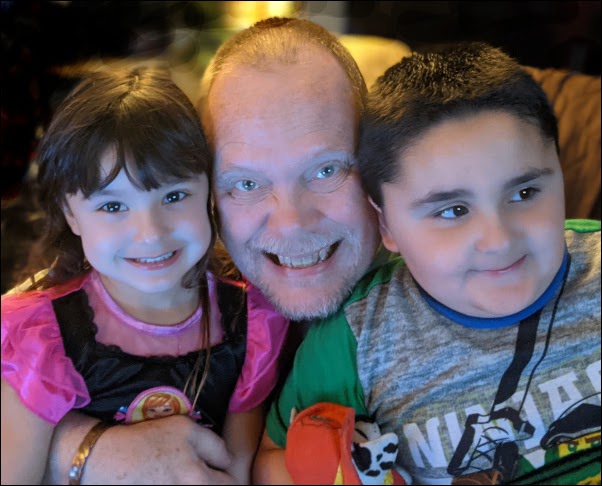| Previous
Page |
PCLinuxOS
Magazine |
PCLinuxOS |
Article List |
Disclaimer |
Next Page |
Welcome From The Chief Editor |
|
I've only ever lived in the U.S., so aside from hearing others who live in other parts of the world talk, I don't have much frame of reference for how "things are" outside of my native country. And, as someone who is still considered "middle class," I don't have the opportunity to travel to the far flung, distant places that I would love to be able to travel to. As such, I apologize in advance that this month's column is going to be rather U.S.-centric.  One of my absolute favorite "personalities" is a guy that you all have most likely watched. He is Mike Rowe, and the host of Discovery channel's hit show, Dirty Jobs. If you're not familiar with him, click on the previous link to bring up some interesting non-Dirty-Jobs appearances that are on YouTube, including a talk he gave for TED. Rowe's time on Dirty Jobs illustrated a real disconnect in the American education system, and in America as a whole, and he set out to try to do something about it. Back in the 1950s through the 1980s, American high schools typically embraced academics and vocational training. Somewhere along that journey, someone thought it would be a good idea that ALL students strive to attend college for a traditional four-year degree. As a result, most high school home economics (cooking) classes, along with auto mechanics, carpentry, metalworking, and other vocational training classes were axed. The end result is/was multifaceted, and not entirely the "good results" that were sought. College students graduating today face ENORMOUS debt directly caused by that college education. The cost of a college education has risen in the U.S. at a rate that outpaces even the costs of health care. College graduates, collectively, face $1.5 trillion (U.S.) of debt. Meanwhile, there are OVER 7 million skilled job openings that cannot be filled, simply because there is no one with the skills to fill those jobs. Most of these jobs are the types of things that were previously taught in high school vocational education programs ... you know, the ones that they did away with. These include diesel mechanics, auto mechanics, carpenters, plumbers, electricians, aircraft mechanics, heavy equipment operators, and other skilled labor jobs. Meanwhile, many of the college graduates ... the ones who are now impacted by a HUGE debt for that college education ... are now either unemployed, under-employed, or working at jobs that have absolutely NOTHING to do with their college education. Sometimes, that situation is understandable. I mean, what can you expect to be able to do with a degree in medieval textiles? The same goes for a gazillion other "professions" with limited marketability or demand. But not everyone needs to be a doctor, or a lawyer, or an engineer, or a teacher, or an accountant. MBAs are a dime-a-dozen these days. Sometimes, you need someone who can pave the roads, build the houses, wire and plumb those houses, landscape the yards, unclog the toilet, build bridges, fix our vehicles, etc. And, because of the push in American education towards EVERYONE getting a college education, we have a surplus of the former, and a serious drought of those trained to do the latter. So, remember I said Rowe set out to do something about that disconnect? Well, in 2008, he founded the Mike Rowe WORKS Foundation to push for training for skilled labor jobs. You can read more about his foundation here. He even has a listing of skilled labor job openings on his foundation website here. I can remember when I was headed into what we then called "junior high school." I was so excited to have a "shop class." There, I made a wooden cutout of a fish, where I learned how to use a bandsaw, a scroll saw, and a coping saw. I made a metal planter, where I learned how to cut metal, spot weld that metal, solder that metal, and paint that metal. We constructed small kit motors, so we could learn the basics of how electric motors worked. The next year, we had "construction" shop class, where we built -- from scratch, with raw materials -- a scaled down corner of a house, complete with wiring, plumbing, insulation, a window, and roofing. I didn't pursue it much further after that, but coupled with what all I did around my childhood house to help my father with projects, I ended up with a pretty solid foundation for the "labor" type jobs. I would be right at my father's side whenever there was a project that had to be completed. That included working on the car, home repairs, home remodeling, making a dog house, repairing and maintaining the lawn mower, and many other "projects" that happened along. I ended up taking a more academic path and going to college (I was the first in my family to EVER get a four-year college degree), while several of my classmates pursued a vocational path. But, still to this day, those "skills" serve me well. I do as many of my own home repairs and maintenance as I'm able (but I HATE plumbing!). I maintain my own lawn mowers and yard equipment. I've built my own chicken coop and run. And, doing these tasks or projects myself is DEEPLY rewarding and satisfying. Readers of my monthly "From The Chief Editor's Desk ..." column will have seen pictures of me with my kids on a regular basis. As a parent, I think it's fairly natural to look at your kids and imagine what path their lives might take. For Ryan, I can see him equally happy in either a skilled job or in one driven more by academics. For Lexi, I can see her finding happiness in more academic roles. They are both right at dad's side whenever I have a project around the house, and I try my hardest to pass on to my kids that passion for the skilled, manual labor tasks that I undertake. Mike Rowe is on to something, I believe. There are good, well paying jobs available for those with the skills and desire to do them. And, they don't require a college education to do them. Gaining employment in one of those "manual trades" will enable a fulfilled life, with decent pay. A job is, after all, a means to an end. This month's cover image is by Photo Mix from Pixabay. Until next month, I bid you peace, happiness, serenity and prosperity ... and continued good health! |

